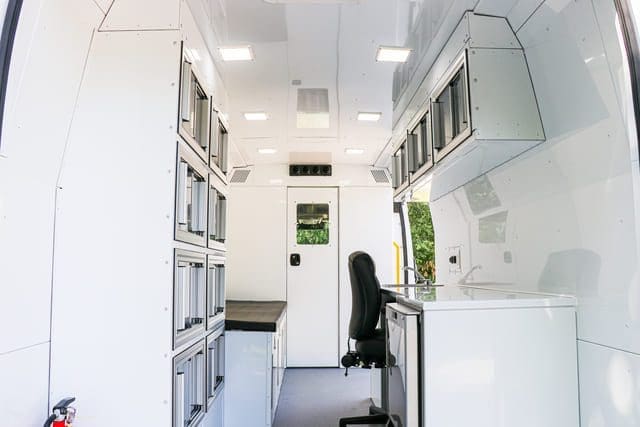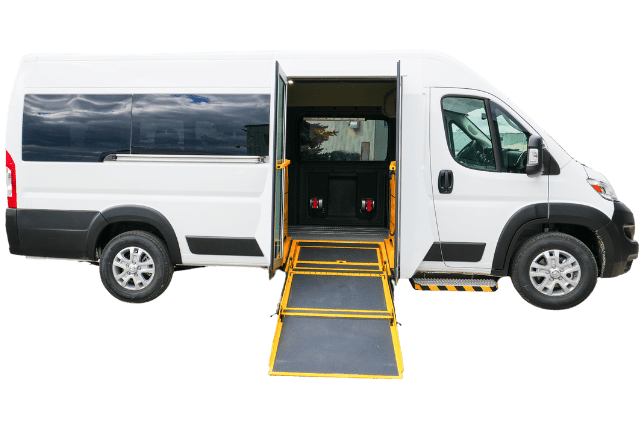Is your organization on a journey to provide mobile healthcare across Canada? If so, it’s important to learn about the mobile medical equipment that can be installed in these innovative clinics. The wrong equipment may not meet your patient’s needs and lower the quality of healthcare services. It can even lead to safety concerns, financial strain, and reputational damage for your clinic.
We’ve been successfully manufacturing mobile medical vans for well over two decades at MoveMobility. We don’t like seeing people facing barriers to healthcare. That’s why we spend countless hours designing these innovative vehicles for organizations like yours that can use them to overcome healthcare barriers.
In this article, you’re going to learn about some of the mobile medical equipment that can be installed in mobile clinics. This will give you a clearer idea of what type of equipment you can get installed in yours when you decide it’s time to purchase one.
What mobile medical equipment can you put in mobile clinics?
When it comes to setting up a mobile medical clinic, the key is having the right tools in your vehicle. The type of equipment you choose depends on the healthcare needs you aim to address across Canada. Let’s take a look at some mobile medical equipment that you can get in your van.
Blood and exam equipment
Blood and exam equipment are important for diagnosing various conditions. Let’s explore three pieces:
Nebulizers: These devices turn medicine into a mist and aid patients with respiratory issues. In scenarios like serving a northern community during winter, where respiratory conditions are common, a nebulizer ensures quick relief for those struggling to breathe.
Glucometers: Glucometers are helpful when managing patients with diabetes. They provide accurate measurements of blood sugar levels.
Picture a senior in a rural area who has mobility issues and no vehicle. With a glucometer in a Mobile Clinic Van, you can easily monitor and manage diabetes. This provides them with personalized care on the spot without needing to make the drive to a hospital.
Stethoscopes: The trusty stethoscope is a doctor’s sidekick. It’s used to listen to the heart and lungs, and no hospital setting would be complete without one.
In a farming community, for instance, a patient complaining of chest discomfort after a day’s work can be quickly assessed in a mobile medical clinic with a stethoscope. Any potential issues that raise a red flag can be addressed promptly.
Welch Allyn medical tools
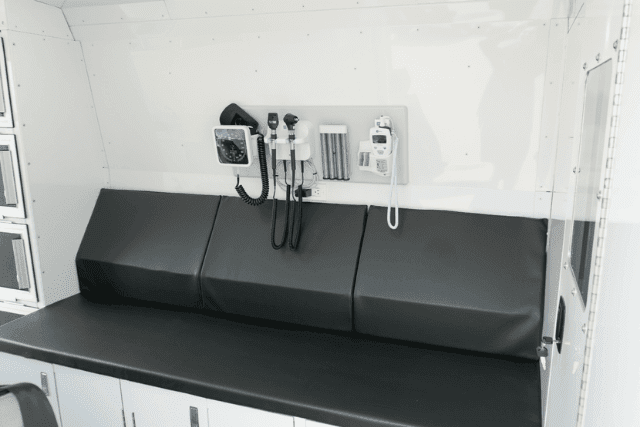
Welch Allyn medical tools are kind of like Swiss Army knives for medical professionals. They offer a lot of adaptability for various examinations.
Otoscope: This tool checks ears and is great for when ear infections and discomfort pop up. Picture a child in a remote neighborhood with ear pain. With an otoscope, you can diagnose the issue and help to provide relief.
Ophthalmoscope: Dealing with an eye condition can be itchy, irritating, and uncomfortable. This tool is key for catching vision issues before they turn into bigger ones.
Thermometer: This is your clinic’s temperature checker. It’s another important tool that your clinic should always have handy, especially during flu season. Checking temperatures helps notice possible illness outbreaks, so you can take action.
Blood pressure monitor: The right blood pressure plays an important role in your overall health. The blood pressure monitor is useful for keeping an eye on the blood pressure of your patients. In a community setting, this monitor ensures everyone’s heart health is checked and monitored.
Compact X-ray machines
Compact X-ray machines capture detailed images of bones inside the body. Their purpose is to help healthcare providers identify issues like broken bones or infections without requiring a visit to the hospital.
Imagine being in a remote area with limited access to a hospital. If someone falls or gets injured, a compact X-ray machine in a mobile clinic allows for a quick assessment.
Portable heart monitors
Portable heart monitors are used to monitor the heart’s electrical activity. They keep track of the heart’s rhythm, ensuring it beats steadily while detecting any irregularities.
In a bustling city center like Toronto, where heart health is a concern, portable heart monitors are a huge help. Picture a patient from in the downtown area with a history of heart issues walking into your mobile clinic. With this monitor, your team can assess their heart health and make health recommendations on the spot.
Ultrasound machines
Ultrasound machines are somewhat like windows into the body. They create images of organs and tissues. They’re particularly useful for checking on developing babies during pregnancy.
Coastal or remote regions have limited access to specialized imaging. The addition of an ultrasound machine to your mobile clinic becomes a massive help for people who need imaging. It allows you to provide prenatal care and diagnostics without the need for a long journey to a hospital.
What other additional equipment can you get in mobile medical clinics?
There are also a couple of other things you should have in your mobile medical clinic.
Sink
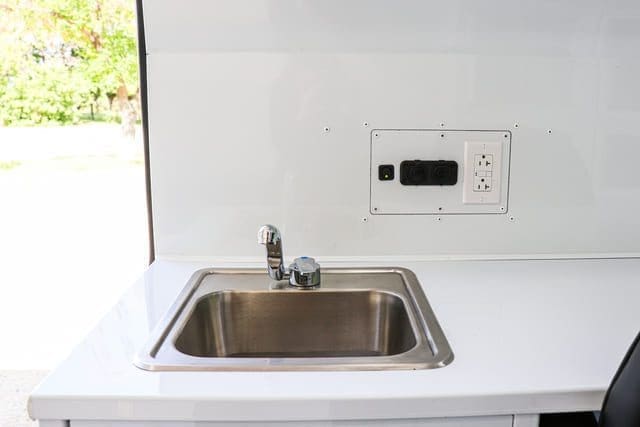
Who doesn’t like having clean hands? A sink in your mobile clinic does more than just provide water. It’s like a hygiene station that makes sure everyone, both patients and healthcare providers, can easily wash their hands. In crowded settings or during events, the sink becomes a wise addition that helps stop the spread of infections.
Fridge
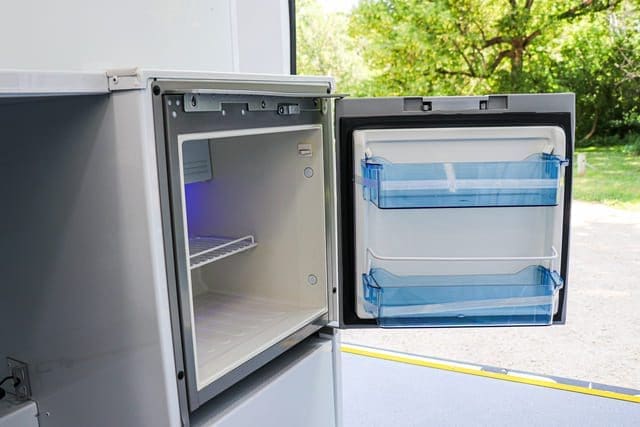
The fridge in a mobile clinic is perfect for storing medications and vaccines that need to stay at a temperature of between 36°F-46°F. Its role is to maintain the right temperature, and this ensures the effectiveness of stored supplies.
If your mobile clinic is going to be involved in vaccination drives, a fridge is required. It keeps vaccines at their optimal state and preserves their potency. Think about a scenario where you’re providing vaccines in a community at a remote location – the fridge ensures that every dose is as effective as it should be, contributing to the overall success of your vaccine drive.
Privacy curtain
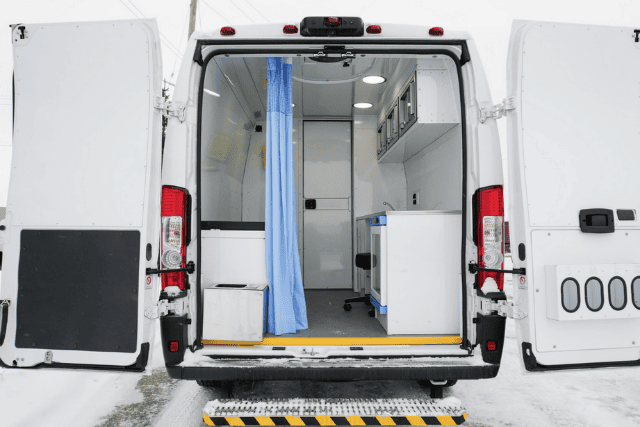
A privacy curtain gives patients a private area in the mobile clinic. It makes healthcare exams feel more dignified and comfortable, away from prying eyes. When you’re talking about your health, the curtain turns the clinic into a safe place where personal matters can feel a little more private.
Think about a busy community event with the mobile clinic; the privacy curtain makes sure personal health exams stay just between the patient and the provider.
Extra spot lighting
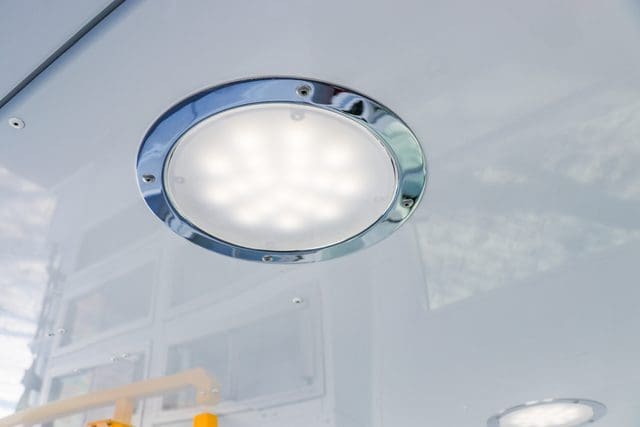
Extra lighting in your mobile clinic gives healthcare providers better visuals of your body and symptoms. A brighter work environment means that no detail is overlooked during assessments.
Better lighting also leads to a safer and more efficient mobile clinic. There will be fewer accidents, smoother workflows, and better security.
Lastly, lighting makes the mobile clinic atmosphere feel a bit more welcoming. This can relieve some anxiety and discomfort for patients.
Think about a mobile clinic stationed in a snowy rural community during the evening hours. The standard lighting, while still good, might need a little something extra to give healthcare providers better visuals to conduct thorough examinations.
With spot lighting, the examination area is brilliantly lit and it allows healthcare providers to assess symptoms, provide accurate diagnoses, and offer immediate care. Patients, despite being in a mobile setting in the evening hours, experience a well-lit and reassuring environment. It enhances their confidence in the healthcare provided.
Where to go next with MoveMobility?
You came to this article looking for more information on what type of mobile medical equipment can be installed in mobile clinics.
You learned that you can install many different types of mobile medical equipment in a Mobile Clinic Van. When deciding what equipment to install, remember that it should align with your program’s mission.
For example, suppose the goal of your program is to provide vaccines and nothing else. It wouldn’t make sense to get an X-ray and ultrasound machine installed. Not unless you foresee you may be providing healthcare services that need this equipment in the future.
If you have any questions regarding the Mobile Clinic Van and what mobile medical equipment you can get installed in it, contact one of our mobility experts today.
From here, you should read our article on mobile medical van customization. This article goes into a bit more detail surrounding the costs and other customization options available to you.
Also, if you’re having some trouble getting your mobile medical clinic off the ground, don’t hesitate to read through our article on how to start a mobile medical clinic in 10 steps.


